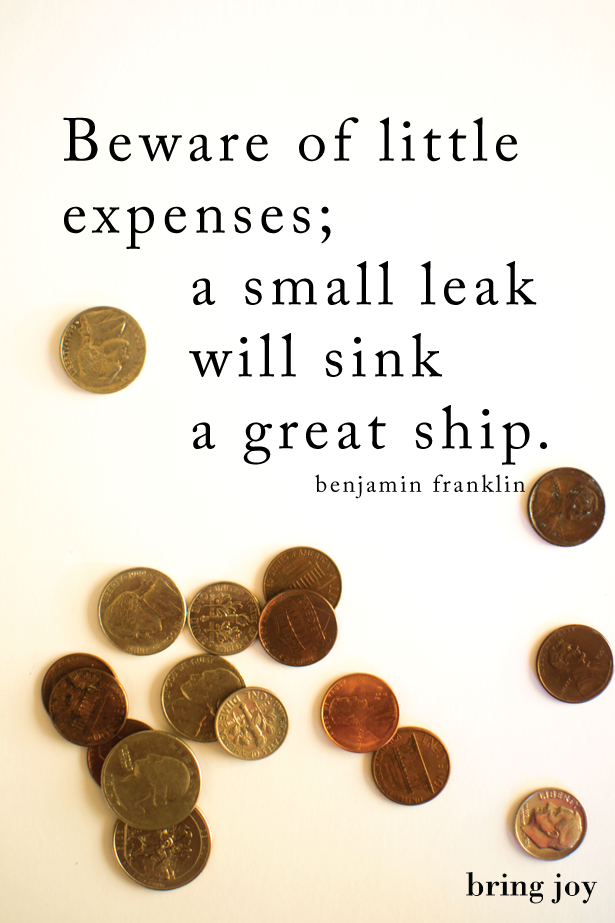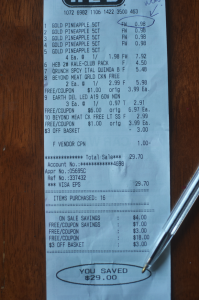The above quote, originally appeared in this post.
Have you ever said to yourself, “Well, I can get ______, it’s just $5”?
Or, it’s not that big a deal, it’s only 15 bucks a month.”
Or, “$60/month is a steal for a gym membership–think of all I’m getting for JUST $60!!”
I know I’ve been guilty.
But $15 here, $5, $20, $10, $12, & $8 there adds up to $48 a month. $70/month adds up to $840 a year. In how running is like getting out of debt fast, I share how we’re quickening our get out of debt pass at lightening speed.
Part of this quickening is putting on our “attention-to-detail” caps which gives us the superhero like quality of being able to focus on the little things. The “details,” that so many people tend to gloss over.
Yes, we’ve always used a budget (used mint.com & then a DIY paper budget before that–a crazy headache when dealing with multiple payment accounts), but it’s only since we started using YNAB* that I have been intimately aware of EVERY little expenditure.
And you know what I’m learning? EVERY little thing counts. I’m talking every little expense, AND every little stream of income. When you combine the two, you gain some powerful monetary momentum (say that three times fast).
In my post, how to live on one income (& love it), I talk about how my role (financially speaking) in the marriage is largely one of defense–I primarily (at this point) protect & manage the money coming in.
Joseph acts mainly as offense–he scores lots of financial points every day (ie. money).
Together we have a symbiotic, complimentary & synergistic relationship.
We communicate about our earnings, our expected & current needs & wants & how that will play out in our budget. We both earn money, we both work together to protect it, but since I’m the stay at home parent, we do take on slightly different roles.
Since I wrote that post however, I’ve started bringing in some income in a variety of ways.
I like to think of it as micro-income–a little here, a little there. Amounts that don’t really raise eyebrows at first glance, but when taken in as a whole, prove to be quite a force of debt-slaying power. (And once we’re out of debt, all of this extra income will mostly go to building savings/retirement, not towards buying more stuff).
Because good ol’ Ben Franklin was right–“a penny saved is a penny earned”–I’m going to make you a little list of all the ways I offensively (earn) & defensively (save) make money.
5 Ways I Offensively & Defensively Earn Money
1. This here blog.
Sheesh, I went a good 5 years without really making much by way of the green stuff. But then I took a course from my friend Bonnie (aff link), which changed my perspective & approach just slightly.
I worked a bit harder & smarter, & badabing-badaboom, I’m making a little cash from blogging. It comes from various sources–my ebooks, advertising (I’ve been very happy with BlogHer), & various affiliates. It’s a satisfying feeling to know that I have an established blog (700+ posts!) that now requires very little upkeep or effort.
Thanks to SEO & Pinterest, bring joy gets a steady flow of unique visitors (nothing crazy-like–somewhere in the 18K range each month) without me spending hours a day trying to gain an audience or traction. Granted, this took years (years!) to do; though I must mention it doesn’t have to take that long if you just cut to the chase & learn the ropes first (which I did not).
Added “offensive” income: $200-$400/month
2. Preschool.
Not only do I save at least $100 by not paying for my 3 year old to attend preschool, but I earn $250 a month by teaching a once a week preschool out of my home, teaching a few of my friends kids. Salem looks forward to her preschool with friends every week, & I honestly enjoy teaching.
Save (ie. “defensive” income): $100/month
Added “offensive” income: $250/month
3. Fixing Mistakes.
This takes time, I realize. BUT, let’s look at the receipt to the left here.
I got a sweet deal on pineapple recently (only $.98 each!). I stocked up & got about 40 lbs. worth–cut them up with my veggie chopper & flash froze them, & stored in our “food storage” freezer. (Why frozen is often better, here.)
I realized after I got home & looked at the receipt.
(Side note: always, always check your receipt right when you get it so you can fix mistakes then & there–easier said then done, especially when you have a screaming baby & hungry preschooler in tow.)
I realized that I was charged $1.98 for four of the pineapples, not the sale price of $.98, which means I paid $4 more than I should have. Did I let it slide? Nope. It took an extra 10 minutes to fix it when I went shopping the next time, but fixing it was like getting paid $4 for 10 minutes of my time. Not bad.
Another thing, just this morning I signed up for Amazon’s Subscribe & Save program (aff link) (you can save up to 15% on items you regularly use by having them shipped to you every 1-6 months).
I had a savings code to save an extra 50% off an item, but when I went to put it in, it didn’t work.
{The coupon code I used can be found here (aff link)–you must be a new Subscribe & Save user & an Amazon Prime member to use it.}
I had two choices–move on & forget about it, or make a 15 minute phone call & get the $14 savings. I made the phone call, the issue was fixed, & I saved $14 on an item I would have purchased anyway. That’s like getting paid $14 (even more, since I’m not paying taxes, or driving anywhere to get there) for 15 minutes of my time. Not bad!
(Also, not only did I get 15% off all the items, plus 50% off one item, I’m also scoring 5% cash back from my Chase Rewards credit card. Like I said, it all adds up.)
Save (ie. “defensive” income): $25-100ish/month
4. Working on the budget. Daily.
Most people spend money every day, or nearly every day. And for that reason, you ought to be recording the transactions in your budget, in order to stay on top of your spending & making sure you’re keeping track of cash flow & expenses.
When I used mint.com to budget, since everything was automated (all accounts are linked to mint & upload all transactions & auto-categorize everything for me), I could go a few weeks (even months sometimes), without looking at our budget. I rationalized this standoffish behavior by telling myself that “we don’t spend very much anyway.”
THIS IS NOT TRUE.
No matter how tight your budget (the argument could be made that the less money you have, the more crucial budgeting becomes), you need to be intimate with your budget (or don’t spend any money).
AS IN, you know (down to a few dollars) what you & your significant other are spending every day.
YNAB* is a budgeting approach that is unique for many reasons, but the thing that makes it stand out from it’s competition (namely mint.com), is that it is NOT automated, which means, you have to manual record your transactions. I think of YNAB as the 21st century version of a checkbook register, except it’s for all of your accounts including cash on hand.
Sounds like a pain, but consider the 10-15 minutes a day (or much less) that you’ll spend recording & going over transactions as putting money in your pocket, ie. you’re getting paid to save yourself money.
Why would you pay for budgeting software when you can get it for free through mint.com?
Great question! I have a longer answer which I will share in an upcoming post, but the short answer is: YNAB is better. It works (if you use it). I don’t care how awesome a product or method is, if it’s not a sustainable approach, who cares??
YNAB helps us keep eagle eyes on our spending & earning. It keeps us all honest around here, & adds a very real presence & “money is real” attitude. It makes us highly accountable. It makes spending money just a little bit painful (a good thing because it makes us think twice before spending a dime).
Sure, you could say, “I’m just not going to spend any money–that’s how I’m going to save money!”. Riiight. That may work for a month or two, but the reality is, particularly if you are a parent or spouse, you’ve will & do spend money nearly every day of the every month. Therefore, YOU NEED A BUDGET (no pun intended).
Save (ie. “defensive” income): several hundred dollars a month, for sure
*YNAB, or You Need A Budget. You should check it out. You can try a free 35 day trial, + take all sorts of really helpful FREE budgeting live courses (they offer several each day, & they’re all online). If you decide to buy, bring joy readers can get 10% using this (aff link) link.
5. Selling & buying stuff on craigslist & Ebay.
Regarding craigslist, check out this post, about eBay, check out this one.
Save (ie. “defensive” income): varies greatly, but we’ve saved hundreds, even thousands over the years
Added “offensive” income: $50-200/month (some months much more)
♥
Let’s see, how do YOU save & earn money? Do tell, in the comments below!





Comments